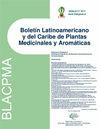墨西哥中部超重或肥胖人群同时使用对抗疗法药物和草药产品进行减肥
IF 0.7
4区 医学
Q4 INTEGRATIVE & COMPLEMENTARY MEDICINE
Boletin Latinoamericano y del Caribe de Plantas Medicinales y Aromaticas
Pub Date : 2023-01-01
DOI:10.37360/blacpma.23.22.2.14
引用次数: 0
摘要
本研究评估了同时使用草药产品减肥(HPWL)和对抗疗法药物的流行程度。评估与HPWL单独使用和与对抗疗法药物联合使用的患病率、不良反应和药物依从性改变相关的因素。该研究采用描述性和横断面调查问卷,对来自墨西哥中部五个城市的超重或肥胖人群(n=662)进行调查。使用莫里斯基药物依从性量表测量药物依从性。HPWL与对抗药物合用的不良反应发生率为25.3%。HPWL的使用影响了68%的药物依从性。在墨西哥中部,超重或肥胖人群中同时使用高强度药物和对抗疗法药物的流行率很高(45.2%)。同时使用HPWL和对抗药物会引起不良反应,主要是胃肠道反应,从而影响药物依从性。本文章由计算机程序翻译,如有差异,请以英文原文为准。
Concomitant use of allopathic medicine and herbal products for weight-loss among people with overweight or obesity from Central Mexico
This study evaluated the prevalence of concomitant use of herbal products for weight loss (HPWL) and allopathic medicine. Factors associated with the prevalence, adverse reactions, and the alteration of medication adherence with the concomitant use of HPWL alone and in combination with allopathic medicine, were assessed. The study was descriptive and cross-sectional using a questionnaire conducted among people with overweight or obesity (n=662) from five cities of Central Mexico. Adherence to medications was measured using the Morisky Medication Adherence Scale. The prevalence of adverse reactions induced by the concomitant use of HPWL, and allopathic medicine was 25.3%. The use of HPWL affected medication adherence by 68%. There is a high prevalence (45.2%) of concomitant use of HPWL and allopathic medicine in people with overweight or obesity in Central Mexico. The concomitant use of HPWL and allopathic medicine induces adverse reactions, mainly gastrointestinal, and thus, medication adherence is affected.
求助全文
通过发布文献求助,成功后即可免费获取论文全文。
去求助
来源期刊

Boletin Latinoamericano y del Caribe de Plantas Medicinales y Aromaticas
PHARMACOLOGY & PHARMACY-
CiteScore
1.30
自引率
14.30%
发文量
49
审稿时长
6-12 weeks
期刊介绍:
The Boletín Latinoamericano y del Caribe de Plantas Medicinales y Aromáticas (BLACPMA), [Latin American and Caribbean Bulletin of Medicinal and Aromatic Plants]; currently edited by the publishing house MS-Editions, is a bi-monthly international publication that publishes original peerreviewed research in the field of medicinal and aromatic plants, with nearly 20 years of experience. BLACPMA is a scientific journal that publishes two types of articles: Reviews (only in English) and Original Articles (Spanish or English), its main lines of action being agronomy, anthropology and ethnobotany, industrial applications, botany, quality and standardization, ecology and biodiversity, pharmacology, phytochemistry, pharmacognosy, regulatory and legislative aspects. While all areas of medicinal plants are welcome and the experimental approaches used can be broad and interdisciplinary; other areas of research that are not mentioned depend on the Editorial Committee for their acceptance.
 求助内容:
求助内容: 应助结果提醒方式:
应助结果提醒方式:


